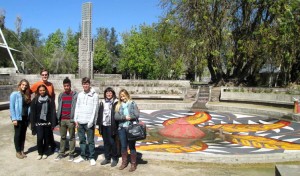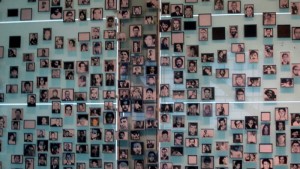
Santiago, Chile: What jumps to mind is the stunning sight of a vibrant city skyline with the backdrop of majestic mountains in a beautiful South American country. Now, imagine it in 1973. Do we know what it looked like?
Many of us who aren’t history buffs don’t, but the scene is less than inviting. It was a war zone.
Last September before the start of fall term, College of Arts and Sciences associate professor Gabriella Ibieta took six students to Chile on a 12-day (including traveling) intensive abroad course to study Chilean literature, where they each earned three credits for an English course titled, “Santiago de Chile: Sites of Remembrance.” The course is catered to students who don’t find it feasible to spend an entire term abroad but still want a global experience.
At the start of 1973 and the Chilean coup d’etat, Chile had become very unstable socially and politically, under the rule of socialist President Salvador Allende. This was the height of the Cold War, with communism taking root all over the hemisphere. As the Chilean Congress fought against Allende, a military group called the “Junta” struck, assassinating the president and taking control of Chile from 1973 through a good portion of the 1980s.
What happened next plagued the Chilean citizens. As the Junta dominated society as they knew it, thousands of Chileans were exiled and displaced due to the political uprising, with thousands of others “disappearing,” never to be heard from or seen by their families again. Their bodies? Never found.
The coup took a huge toll from the nation, but from it, came some of the most notable pieces of Chilean Literature — stories filled with both action and tragedy. How better could a reader understand these works than to visit the sites of the tragedies themselves?
That’s a question Ibieta likely considered as she worked in conjunction with Drexel’s study abroad program to create a trip to specifically explore this violent and turbulent period of history.
“[The work] becomes much more real when you’re at an actual sight,” Ibieta explained of the true experience of piece of literature.
“From an academic standpoint, it’s amazing how much I learned through this experience and all in such a very short time. Without this experience and merely reading the texts, I don’t think I would have walked away with as deep of an understanding of the social injustice the people of Chile face[d],” Madison Sukenick, a business student who joined Ibieta on the trip, said.
The only academic requirement the students had while in Chile was to journal each day about what they saw at a specific sight and give a personal reflection on it.
While in Chile, they explored many different historical sights to provide them with the insight they needed to more deeply understand the Chilean culture in context of the pieces they would read. The places they visited included both museums and nature sites, from the Museum of Pre-Columbian Art, the Historic Center of Santiago and to San Cristobal Hill, Santiago’s secondighest point.
They interacted with other students in a visit to Pontifical Catholic University of Chile. The group also spent two days on the coast of Chile, where they got to tour the home of Nobel Prize-winning poet Pablo Neruda, and visit Valparaiso, an important Latin American seaport.
However, as noted by both Ibieta and the students, the emphasis and most profound sites of the trip were two visits to the Museum of Memory and Human Rights, and a trip Villa Grimaldi Peace Park. These two sites most strongly represent the conflict that the people of Chile faced. Their journals reflected their appreciation for each of these sights.
“The … thing that struck me most was a wall of faces, not immediately visible from the floor, but viewed from a room lined with plastic candles,” international area studies major Patrick Michaelis wrote in his journal about an exhibit in the Museum of Memory and Human Rights. “You can read all you want about the numbers of people who were killed, but actually seeing them puts a human spin on it that really couldn’t be achieved otherwise. That in particular was the most moving part of what is truly a moving museum.”

Similarly, the response to Villa Grimaldi was emotional.
“Trying to reconstruct the history of one’s country while paying respect to those who were victims to said history is a difficult and delicate task. I felt that Villa Grimaldi captured this confusion; it was an attempt to make peace with a history that is still very much unsettled. Various pieces of Villa Grimaldi were created to symbolize the brutality that occurred here or the victim’s feelings towards it … the memorial is well done,” marketing major Elizabeth Slenker commented.
Unlike many other short-term Drexel courses abroad, this trip wasn’t over when the students returned from Chile. That was just the start — after gaining the entire cultural context, that’s when they studied the literature. The class met once a week on Thursday evenings, in a similar nature to a traditional literature course. They read four novels and numerous articles on Chile, all with the benefit of experiencing the country and the culture first hand.
Ibieta is enthusiastic that the trip will be running again this fall, from Sept. 6-15. The deadline to apply for the trip is May 1, and the program costs $750 (excluding airfare and meals).
“The University has a very precise plan of what we want to accomplish. … One of those goals is to truly make Drexel very global,” Ibieta explained.
With such a positive reaction to this trip from the students, it’s not a question that many others will want to take their Drexel career abroad too.


